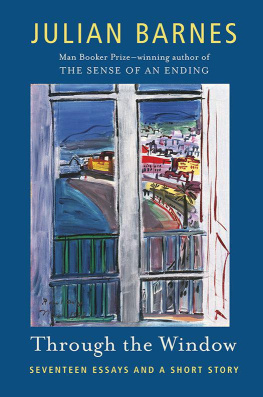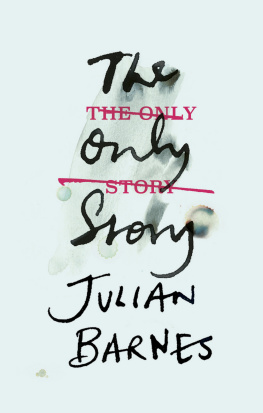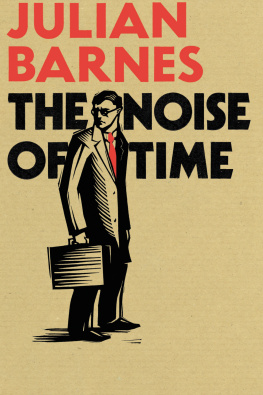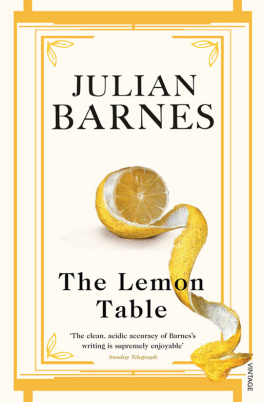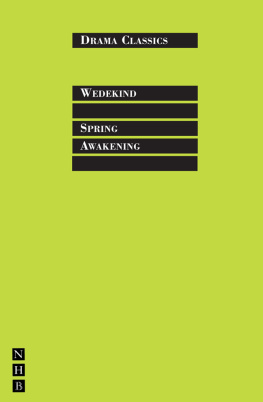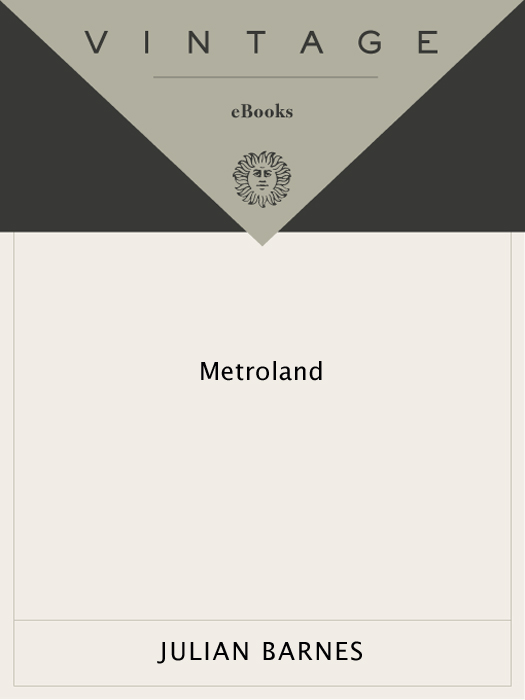Praise for Julian Barness
METROLAND
One would have to look hard to find a wryer, more lovingly detailed account of intellectual and sexual innocence abroad. Metroland portrays at once the disturbing aspects of adulthood and the consolations of maturity, a balance that makes one glad Julian Barnes is still young and still writing.
Jay Parini, The New York Times
Barness books celebrate the human imagination, the human heart, the boisterous diversity of our gene pool, our activities, our delusions. They thrill the mind and the emotions; and he achieves, without tricks or puns, what Nabokov loved: esthetic bliss.
Chicago Sun-Times
If all works of fiction were as thoughtful, as subtle, as well constructed, and as funny as Metroland, there would be no more talk of the death of the novel.
New Statesman
Julian Barnes is one of a handful of innovative English novelists who have succeeded in pulling the English novel out of the provincial rut in which it lay.
Newsday
Flighty, playful Barnes succeeds in vividly re-creating teenage precociousness, particularly what it feels like to be a young male encountering love and sex.
Los Angeles Times
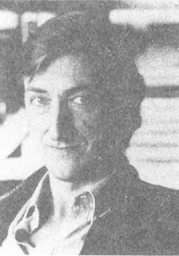
Julian Barnes
METROLAND
Julian Barnes was born in Leicester, England, in 1946, was educated at Oxford University, and now lives in London. His first six novels Metroland, Before She Met Me, Flauberts Parrot, Staring at the Sun, A History of the World in 10 Chapters, and Talking It Over have brought him international acclaim. His newest novel, The Porcupine, has just been published.

ALSO BY Julian Barnes
Before She Met Me
Flauberts Parrot
Staring at the Sun
A History of the World in 10 Chapters
Talking It Over
The Porcupine

First Vintage International Edition, November 1992
Copyright 1980 by Julian Barnes
All rights reserved under International and Pan-American Copyright Conventions. Published in the United States by
Vintage Books, a division of Random House, Inc., New York.
Originally published in hardcover by Jonathan Cape Ltd.,
London, in 1980.
Library of Congress Cataloging-in-Publication Data
Barnes, Julian.
Metroland/Julian Barnes. 1st Vintage International ed.
p. cm.
eISBN: 978-0-307-79777-3
I. Title.
[PR6052.A6657M47 1992]
823.914dc20 9250092
Author photo Miriam Berkley
v3.1
To Laurien
Contents
PART ONE
Metroland (1963)
A noir, E blanc, I rouge, U vert, O bleu
Rimbaud
There is no rule against carrying binoculars in the National Gallery.
On this particular Wednesday afternoon in the summer of 1963, Toni had the notebook and I had the glasses. So far, it had been a productive visit. There had been the young nun in mens spectacles who smiled sentimentally at the Arnolfini Wedding, and then, after a few moments, frowned and made a disapproving cluck. There had been the anoraked girl hiker, so transfixed by the Crivelli altarpiece that we simply stood on either side of her and noted the subtlest parting of the lips, the faintest tautening of skin across the cheekbones and the brow (Spot anything on the temple your side? Zero so Toni wrote down Temple twitch; LHS only). And there had been the man in the chalk-stripe suit, hair precisely parted an inch above his right ear, who twitched and squirmed in front of a small Monet landscape. He puffed out his cheeks, leaned back slowly on his heels, and exhaled like a discreet balloon.
Then we came to one of our favourite rooms, and one of our most useful pictures: Van Dycks equestrian portrait of Charles I. A middle-aged lady in a red mackintosh was sitting in front of it. Toni and I walked quietly to the padded bench at the other end of the room, and pretended interest in a tritely jocund Franz Hals. Then, while he shielded me, I moved forward a little and focussed the glasses on her. We were far enough away for me to be able to whisper notes to Toni quite safely; if she heard anything, shed take it for the usual background murmur of admiration and assent.
The gallery was fairly empty that afternoon, and the woman was quite at ease with the portrait. I had time to impart a few speculative biographical details.
Dorking? Bagshot? Forty-five, fifty. Shoppers return. Married, two children, doesnt let him fug her any more. Surface happiness, deep discontent.
That seemed to cover it. She was gazing up at the picture now like an icon-worshipper. Her eyes hosed it swiftly up and down, then settled, and began to move slowly over its surface. At times, her head would cock sideways and her neck thrust forward; her nostrils appeared to widen, as if she scented new correspondences in the painting; her hands moved on her thighs in little flutters. Gradually, her movements quietened down.
Sort of religious peace, I muttered to Toni. Well, quasi-religious, anyway; put that.
I focussed on her hands again; they were now clasped together like an altar-boys. Then I tilted the binoculars back up to her face. She had closed her eyes. I mentioned this.
Seems to be recreating the beauty of whats in front of her; or savouring the after-image; cant tell.
I kept the glasses on her for a full two minutes, while Toni, his biro raised, waited for my next comment.
There were two ways of reading it: either she was beyond the point of observable pleasure; or else she was asleep.
1 Orange Plus Red
Cut privet still smells of sour apples, as it did when I was sixteen; but this is a rare, lingering exception. At that age, everything seemed more open to analogy, to metaphor, than it does now. There were more meanings, more interpretations, a greater variety of available truths. There was more symbolism. Things contained more.
Take my mothers coat, for example. She had made it herself, on a dressmakers dummy which lived under the stairs and told you everything and nothing about the female body (see what I mean?). The coat was reversible, pillar-box red on one side, an expansive black and white check on the other; the lapels, being made of the inner material, provided what the pattern called a dash of contrast at the neck and chimed with the large square patch pockets. It was, I now see, a highly skilful piece of needlework; then, it proved to me that my mother was a turncoat.
This evidence of duplicity was corroborated one year when the family went to the Channel Islands for a holiday. The size of the coats pockets, it transpired, was exactly that of a flat-pack of 200 cigarettes; and my mother walked back through the customs with 800 contraband Senior Service. I felt, by association, guilt and excitement; but also, further down, a private sense of being right.


